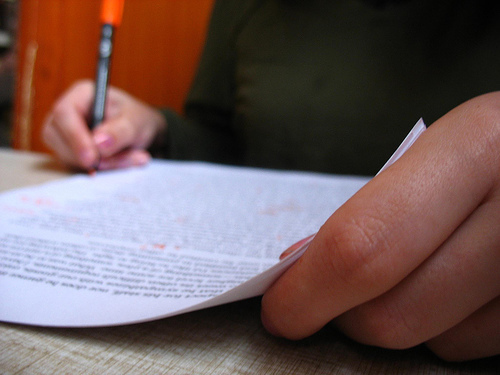A Note from Your Beta Reader: 4 Tips for Receiving Feedback

For a long time, I considered myself more an editor than a writer. And if I was being really honest, as I’m sitting in this office writing this to hundreds of creative and dedicated Wrimos, I’d still say my strong suit is helping other’s write.
That being said, I’ve been on the receiving end of some fairly harsh writing criticism: professors telling me that my argument is unsupportable, or friends pointing out the skewed ratio of fluff to substance in my essays. And it sucks. Because that’s my writing, and that’s me. All of those deer-in-red-penned-headlights experiences have come to inform my edits, and there are a few things I always tell my friends when they hand over their precious drafts:
Clone me!
Well, not really. That could create some tricky evil-twin scenarios in which I may not prevail. But definitely don’t let me be the solo-editor. I’m a reader with a distinct taste and skill-set that has been informed by my own life experiences. Just because I don’t like something doesn’t mean it should be thrown out entirely. If a few other people agree with me, though, then it might be time to “kill those darlings.”
Don’t look at me; I’m reviewing!
Seriously. If you’re in a writing group, and you’re in the midst of a group editing session, don’t stare down your beta reader. I can always feel the hot, laser-like glare of a writer anxiously awaiting my notes. This is the moment where my mind usually wanders.
“They’re looking at me. Are they judging my edits before they see them? Or are they just judging my hair? Does my hair look okay? Should I dye it violet? Hmm…violet.”
Vain, yes, but you get the picture. Give your reader some space and time, and you’ll get focused, detailed notes.
Speaking of judgement…
I’m not reviewing you as a writer, just this draft.
This is something I’ve become acutely aware of making clear since having my own writing workshopped more. When someone tells you to move around some commas, or to focus less on a specific scene, it’s not an attack on your writing as a whole or even the piece as a whole.
I’ve also found that this is the moment where a dialogue between writer and editor can open up and be most helpful. You can talk through what the scene could look like from another angle, or you could add another dimension to your character by splicing in something new.
Fresh looks at one’s writing like this can be lost by getting overly defensive. I know, because I’ve done it (imagine real tears over my edited draft, and a fairly baffled editor). It was my writing that suffered the consequences.
Let me read the finished product! Please?
Usually, I can deal if this never happens, but I do wonder about what the characters and plot end up looking like after that first revision. Sometimes that wonder borders on obsession. So, spare your beta readers the embarrassment of begging and harassing you for a final draft! They read for pleasure, too, and your writing is no exception. Your work is fabulous; share the love.
What do you tell your writer friends and colleagues before looking over their work? And what would you most want to hear from your beta reader?
— Shelby
Photo by Flickr user Orin Zebest.
Chris Baty's Blog
- Chris Baty's profile
- 63 followers



